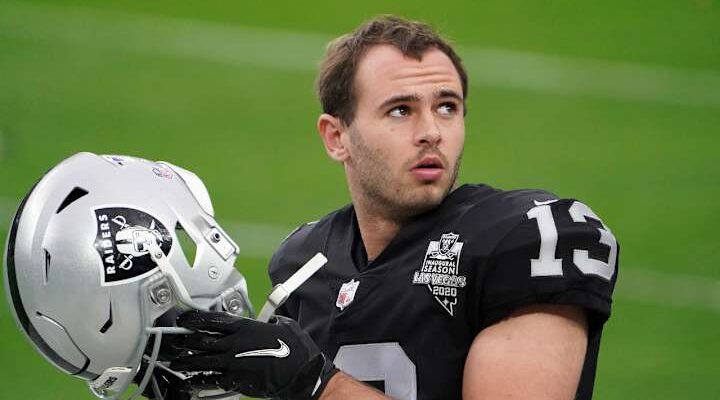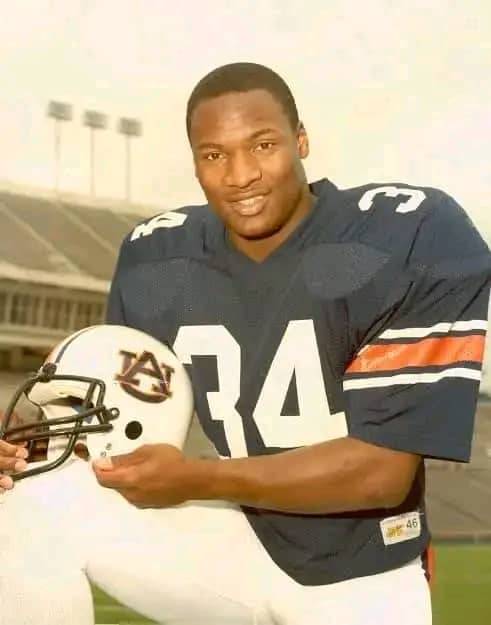Hunter Renfrow, Former Clemson Star, Signs with the Panthers—Continuing a Bizarre NFL Trend
Hunter Renfrow, the former Clemson standout wide receiver known for his clutch catches and underdog story, has signed with the Carolina Panthers, a move that adds a fascinating twist to an already unusual pattern emerging in the NFL. Renfrow, once considered the embodiment of the scrappy, overlooked slot receiver, had found early success with the Las Vegas Raiders, including a 1,000-yard Pro Bowl season in 2021. However, injuries, coaching changes, and evolving team strategies led to a steep decline in his role and production over the past two seasons.
Now, as he joins the Panthers in what many are calling a fresh start, Renfrow becomes part of a peculiar NFL trend—one that sees players returning to regional roots, familiar coaching faces, or seemingly unconventional destinations in pursuit of revitalization. For the Panthers, a team desperately seeking offensive identity and leadership for young quarterback Bryce Young, the acquisition of Renfrow is both practical and symbolic. It underscores the NFL’s cyclical nature and how personal and professional connections continue to shape careers in ways metrics and mock drafts can never fully predict.
Renfrow’s journey is the stuff of college football legend. A former walk-on at Clemson, he famously caught the game-winning touchdown pass from Deshaun Watson in the 2017 College Football Playoff National Championship against Alabama, cementing his legacy in Tigers history. Despite lacking the prototypical size or speed scouts typically covet in NFL receivers, Renfrow’s precision route running, reliable hands, and football IQ earned him a fifth-round selection by the Raiders in the 2019 NFL Draft.
What followed was a gradual but unmistakable rise. By his third season, Renfrow emerged as one of the league’s most productive slot receivers, catching 103 passes for 1,038 yards and nine touchdowns. His rapport with then-quarterback Derek Carr was built on trust and timing—hallmarks of great slot receiver play. But when Josh McDaniels replaced interim head coach Rich Bisaccia in 2022, the offensive system shifted, and Renfrow’s role diminished. Injuries and a lack of schematic fit led to him recording just 36 receptions over the next two seasons combined.
Now at 28, Renfrow is at a career crossroads. Joining the Panthers offers a chance at reinvention, but the move also highlights a broader trend in the NFL: players seeking out teams and environments that feel like home, either geographically or emotionally. For Renfrow, Carolina checks both boxes. The Panthers’ new head coach Dave Canales brings a reputation for building quarterback-friendly offenses that emphasize timing routes and slot production—precisely Renfrow’s strengths. More importantly, the proximity to Clemson, where he remains a beloved figure, offers a sense of familiarity and fan support that could reignite his confidence.
This return-to-roots pattern isn’t unique to Renfrow. In recent years, several NFL veterans have opted for teams that align with their personal histories or prior professional connections, sometimes in defiance of prevailing market logic. Consider Odell Beckham Jr.’s move to Baltimore to reunite with a coaching staff that believed in his ability to bounce back from injury, or Russell Wilson’s decision to join the Pittsburgh Steelers, a team with a structure and leadership style more aligned with his traditional values.
There’s also the example of Baker Mayfield, who revitalized his career with the Tampa Bay Buccaneers—a franchise that had previously been deemed a quarterback graveyard—thanks to a coaching staff willing to build an offense around his strengths. These moves, while not always headline-grabbing in the way blockbuster trades are, represent a deeper layer of strategy: players betting on culture, chemistry, and coaching fit over raw financial incentives or market prestige.
The Panthers, for their part, are building with a sense of urgency. After a dismal 2-15 season in 2023, which ended with the worst record in the NFL and widespread organizational upheaval, the team is placing its hopes in the development of second-year quarterback Bryce Young. A former Heisman winner and No. 1 overall pick, Young endured a brutal rookie campaign marked by poor protection, minimal weaponry, and multiple coaching changes. The addition of Renfrow offers a safety blanket—both literally on the field and figuratively in the locker room.
Renfrow’s skill set is particularly valuable for a young quarterback still adjusting to NFL speed and complexity. His ability to find soft spots in zone coverage, execute crisp option routes, and convert crucial third downs aligns perfectly with the kind of incremental, rhythm-based offense Canales wants to install. While Renfrow may no longer be a primary weapon in a pass-happy attack, his veteran presence and dependability can have an outsized impact on Young’s development.
This move also signals a philosophical shift for the Panthers. Instead of chasing flash or big-name free agents, they are targeting players who bring intangible value—leadership, professionalism, and a deep understanding of situational football. Renfrow fits that mold. Even during his reduced role in Las Vegas, he maintained a reputation as a locker room favorite and a relentless worker. In a young and rebuilding locker room, those traits are often more valuable than raw athleticism.
Beyond the X’s and O’s, Renfrow’s signing speaks to the enduring power of narrative in professional sports. Fans remember his heroic moments at Clemson and the underdog story that captivated college football. His return to the Carolinas evokes a sense of homecoming, a story arc that fans can emotionally invest in. In an era where player movement is often dictated by algorithms and cap calculations, moves like this remind us of the human side of football.
It also raises a broader question: why are so many NFL veterans opting for emotionally resonant destinations over potentially more lucrative ones? The answer lies in a confluence of factors. For one, the salary cap landscape has made mid-tier veterans expendable, forcing them to prioritize fit and opportunity over guaranteed dollars. Additionally, the increasing complexity of NFL schemes means that familiarity with a system—or trust in a coaching staff—can dramatically impact a player’s effectiveness and longevity.
For Renfrow, the Panthers offer both a football fit and a cultural alignment. He joins a wide receiver room that includes Adam Thielen, another veteran known for precision and reliability, and rookie Xavier Legette, a high-upside talent drafted out of South Carolina. Together, this group represents a blend of experience and potential—a perfect environment for Renfrow to thrive if given the chance.
The pressure, of course, remains immense. Carolina’s front office, led by general manager Dan Morgan, knows that another losing season could stunt Young’s growth and sour fan enthusiasm. Every move, including the addition of a seemingly low-risk veteran like Renfrow, carries weight. Yet in a league where the margin between success and irrelevance is razor-thin, it’s often the unheralded signings that make the biggest difference.
Renfrow’s NFL arc may never resemble that of a top-tier superstar, but his value has always transcended stats. At his best, he is a chain-mover, a red-zone technician, and a calming presence amid chaos. For a team like Carolina, looking to establish identity and rhythm, those qualities are invaluable. If he can stay healthy and carve out a defined role in Canales’s offense, there’s every reason to believe Renfrow can rediscover the form that made him a Pro Bowler just three seasons ago.
And in doing so, he would add yet another chapter to the growing story of NFL veterans finding second (or third) life by leaning into the things that made them special in the first place—not just talent, but connection, context, and character.
In a sport increasingly dominated by analytics, sometimes the intangible matters most. For Hunter Renfrow and the Carolina Panthers, that belief may just pay off.



